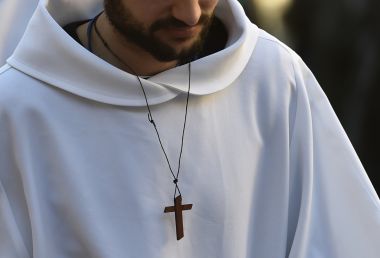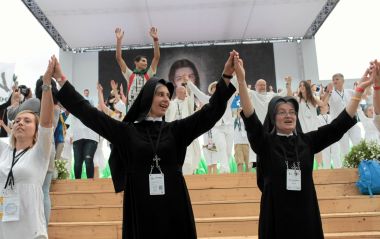Why are young evangelicals seeking out traditional worship?

I was maybe 13 or 14 and in a Religious Studies class. At my (Church of England) state school, church attendance was compulsory to be admitted. In the class we were asked to draw a picture of our church. It was the prelude to a discussion about our different churches, the buildings, the worship style and our experience of them.
While many people in the class had already stopped attending church once they'd got a place at the school, some still were regular worshippers. They mostly drew church buildings that looked nothing like what I drew.
They sketched out a classic 'churchy' looking building. There were spires and old stone structures, surrounded by graveyards - generally places that looked like churches. I sketched out a 1960s concrete and glass structure. At the time, the church we attended was meeting in a Further Education College so that was the building I drew. I was secretly feeling pretty pleased with myself. As the discussion in the class moved forward and some others described the worship in their services as boring, I was able proudly to proclaim that we had electric guitars, and doughnuts before the service (meeting as we called it).
This small incident was a microcosm of the relationship I had to tradition when I was growing up. I saw it as pretty irrelevant to the practice of faith. What could those old, cold buildings possibly have to offer? By extension, what could the kind of Christianity that happened in these places ever offer me? In my mind it was stale, repetitive and irrelevant to the late 20th Century world in which I was growing up.
Fast forward to 2016 and while I haven't lost my love for electric guitars in worship (and I'm always happy to be offered a doughnut) I realise that my youthful view was far too reductive. The tradition of the Church, liturgy, the creeds, apostolic succession, the Eucharist and much more all play an important role in my expression of faith. It seems many others are on a similar journey – especially younger people.
Across the US and the UK there is a movement of younger people from an evangelical background who are reconnecting with the heritage and tradition of the Church.
This takes many forms, but it caught my eye this week that the Prayer Book Society – a group dedicated to promoting the Book of Common Prayer – is proclaiming a "National resurgence" in its use. The Book, which forms the basis of Anglican liturgy and theology was first written in the mid 16th Century and revised in 1662. Although some parishes have continued to use it since then, many have moved away from it, either using Common Worship – the more contemporary liturgical style, or doing away with liturgical worship altogether.
However, the Society now says that many younger people are expressing an interest in the Prayer Book. "Many young people... are coming across The Book of Common Prayer for the first time," said spokeperson John Service. "They are struck by the beauty and relevance of the language which has inspired writers like Shakespeare as well as churchgoers down the ages."
24-year-old Fergus Butler-Gallie who's training to be an Anglican priest says he's noticed a pattern with younger people who are keen to have more substantive expressions of worship. "The words... found in The Book of Common Prayer satisfy that hunger as they rediscover past patterns of worship and understand their significance," he said.
It isn't just the Prayer Book, though. Younger people seem to be rediscovering more traditional, liturgical expressions of worship across the board.
Rev Erik Parker has blogged about the phenomenon of being a 'high church millenial' – in the Lutheran tradition. Rachel Held Evans has written a book about her journey from evangelicalism to Episcopalianism. It isn't just Protestant denominations either. Some young evangelicals are becoming Roman Catholics, with one writer suggesting, "college [is] a ripe breeding ground for interest in Roman Catholicism. Among the traits of the Catholic Church that attract... students - and indeed many young evangelicals at large - are its history, emphasis on liturgy, and tradition of intellectualism."
Indeed, there seems to be a thirst for Orthodox Christian faith as well. The most popular piece I've ever written for Christian Today was about the Jesus Prayer – an ancient prayer of the Orthodox Church.
Lambeth Palace, the home of the Archbishop of Canterbury, itself now plays host to a community of young people from around the world, who live under a rule of regular prayer, meditation and worship.

This trend towards tradition may tell us many things. The sociological, historical and political factors in all of this can't be ignored, but there isn't space to examine them here – in fact whole doctorates could be written on the phenomenon. One thing is for sure though – embracing a more traditional, liturgical style of worship doesn't mean abandoning more informal, evangelical practices.
The old can (and probably should) be held in positive tension with the new. If we as believers and our churches were open to embracing a broader range of styles, it would surely deepen our spiritual experience.
Pastor Brian Zahnd describes his journey as a charismatic evangelical like this: "As far as I was concerned, most Catholics, Orthodox, Anglicans, and mainline Protestants needed to 'get saved' — which is to say, they needed to become my 'style' of Christian... [But now] This much I'm sure of: Orthodox mystery, Catholic beauty, Anglican liturgy, Protestant audacity, Evangelical energy, Charismatic reality — I need it all!"
So what does the future hold? It's hard to say, but the search for tradition and structure alongside the energy and dynamism of evangelicalism is a potent mix. Some churches are investigating a 'cross-tradition' approach which seeks to blend these different elements. In an article entitled, 'Why Millennials Long for Liturgy', Gracy Olmstead writes, "The millennial generation is seeking a holistic, honest, yet mysterious truth... Protestant churches that want to preserve their youth membership may have to develop a greater openness toward the treasures of the past. One thing seems certain: this 'sacramental yearning' will not go away."
Follow Andy Walton on Twitter @waltonandy











